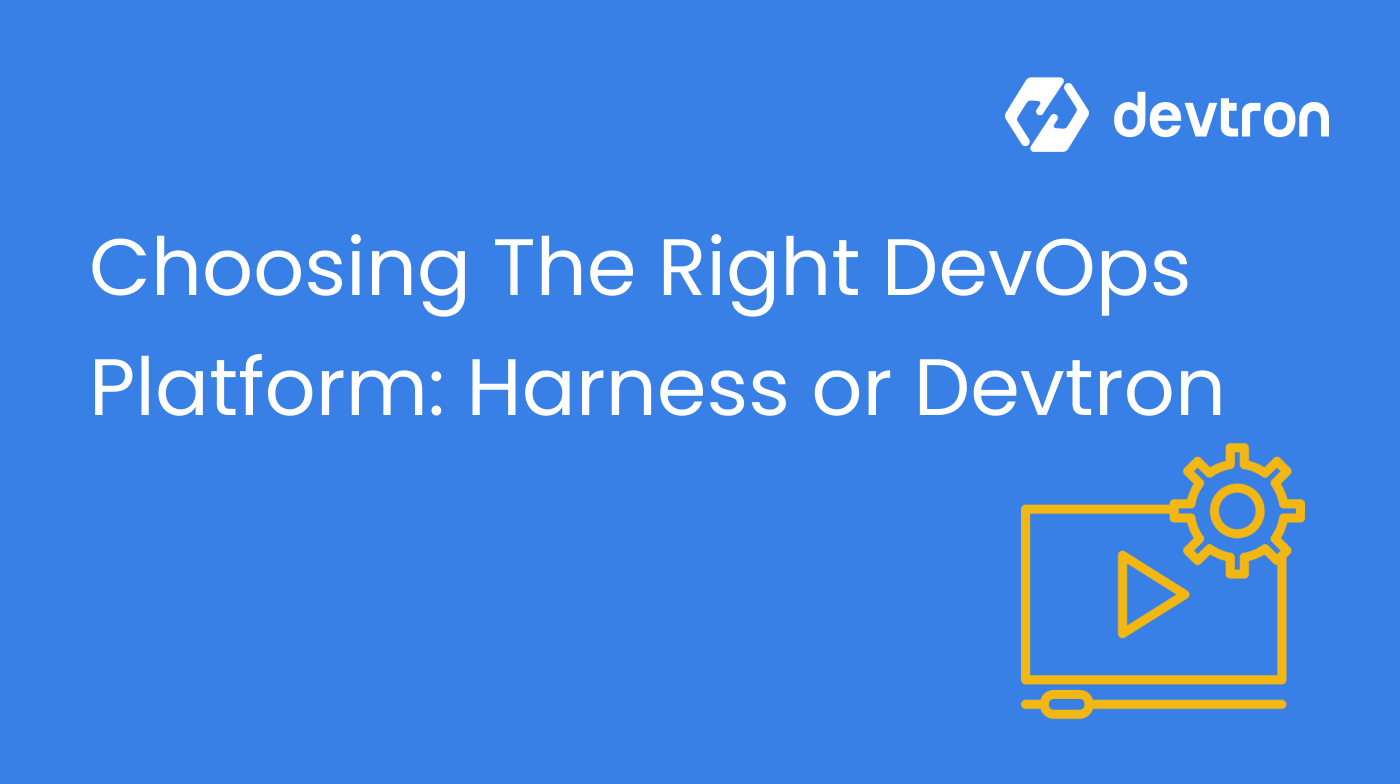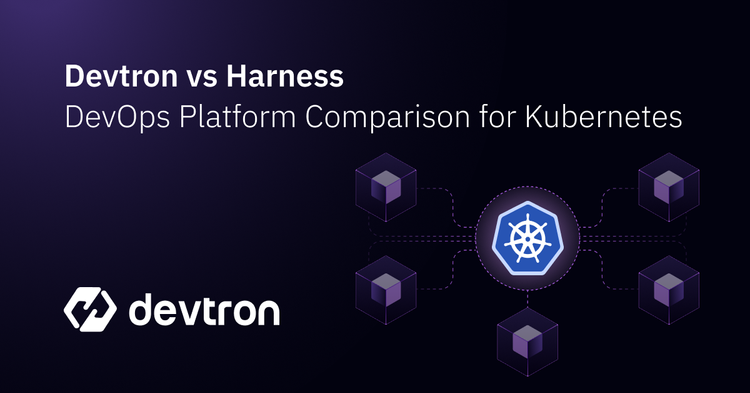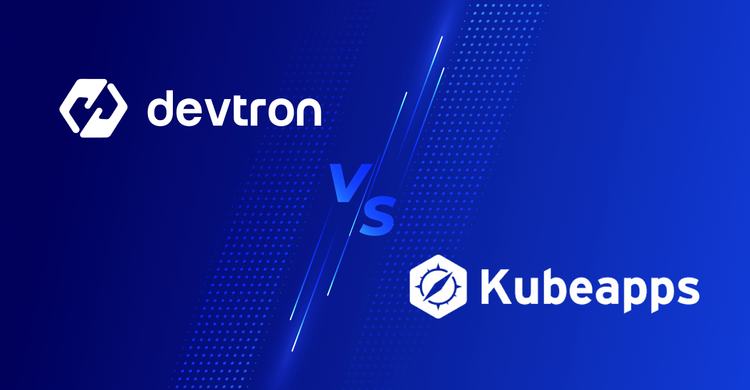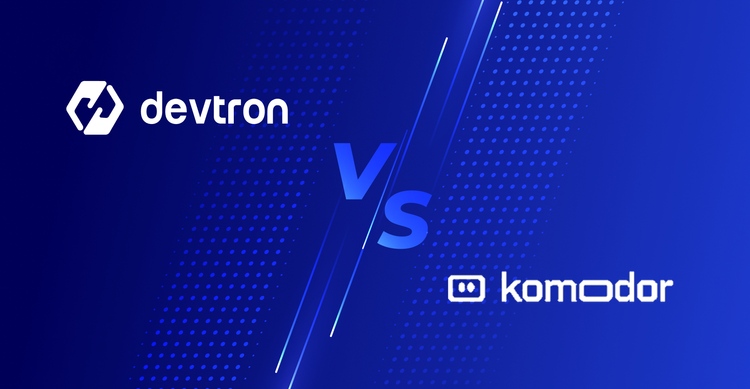Choosing a suitable DevOps platform can greatly influence a software project's efficiency, agility, and success. In this article, we’ll look at an in-depth comparison of two notable platforms: Harness and Devtron. Each brings its own set of features and capabilities to the DevOps arena. We aim to provide a clear and comprehensive analysis, guiding you toward a decision that best suits your development needs. Join us as we explore and contrast these platforms, shedding light on their unique strengths in modern software development.
Overview of Devtron
Devtron, a Kubernetes-native CI/CD platform, marks a significant evolution in DevOps tools. It offers a specialized solution for Kubernetes, streamlining deployment processes and providing an unmatched level of simplicity for rapid adoption and onboarding.
- Open-Source Nature and Kubernetes CI/CD and Automation: As an open-source platform, Devtron invites widespread use and community-driven improvements. Its focus on Kubernetes makes it a go-to for related CI/CD tasks, offering tailored functionalities.
- CI/CD and Containerization Features: Devtron automates CI/CD pipelines, specifically for Kubernetes, using Buildpacks for efficient containerization. It supports advanced deployment strategies and integrates with many other tools in the devops toolchain.
- GitOps and Cloud-Native Features: Devtron goes beyond simply embracing the GitOps methodology to solving problems of scale and governance that every company encounters when they use the defacto GitOps standard, ArgoCD. Devtron’s cloud-native orientation also makes it a versatile choice for various cloud environments, including AWS, Azure, and Google Cloud.
- Extended Capabilities: While Devtron doesn’t have nearly the breadth of capabilities as Harness, it has an impressive set of features that is growing rapidly. Devtron’s platform capabilities include CI/CD, DevSecOps, Cloud Resource Management, automated containerization, and a detailed Kubernetes dashboard that replaces the need to learn the Kubernetes command line. Devtron’s platform licensing is all-inclusive and TCO is significantly less than most DevOps platforms.
Devtron’s DevOps Community
Supported by a robust community ranging from DevOps Engineers to development teams, Devtron provides extensive resources and documentation, making it a preferred choice for Kubernetes deployments in diverse software projects.
Overview of Harness
Harness.io, like another popular platform, Jenkins, has evolved from a focused solution (Harness originally was a CD tool and Jenkins was a CI tool) to a comprehensive DevOps platform. It simplifies and accelerates software delivery, paralleling Jenkins’s focus on CI/CD. Harness automates CI/CD pipelines and emphasizes rapid, reliable software releases like Jenkins. It also offers strong Kubernetes support and GitOps features, catering to diverse cloud environments. Today, Harness goes well beyond the open-source capabilities of Jenkins and should be considered more similar to the commercial implementation of Jenkins by Cloudbees.
Key Features of Harness
Harness is an incredibly capable platform which can be considered good and bad at the same time. Providing so many capabilities in a single platform ultimately leads to complexity which can slow down the rollout and adoption of a solution like Harness. Here are some key features of Harness that we’ll dive into deeper throughout this post.
- CI/CD and Automation: Built on the concept of declarative pipelines, Harness excels in automating CI/CD pipelines, reducing manual effort, and minimizing the scope for errors. This automation streamlines the workflow, making the software delivery process more efficient.
- Continuous Delivery: It focuses on the rapid and reliable release of software, ensuring that new features and updates reach users quickly and securely. Harness makes it easy to deploy applications using advanced deployment patterns like Blue-Green and Canary. There is even a machine learning component to help users understand if their deployments are good or bad (although this determination often requires complex analysis beyond the scope of simple machine learning).
- Kubernetes Support: Harness provides robust Kubernetes support, essential for teams working with containerized applications and microservices. This support is integral for cloud-native development, ensuring scalability and flexibility in deployment.
- GitOps and Cloud-Native Features: Embracing the GitOps methodology, Harness enhances version control and collaboration. Its cloud-native orientation makes it a versatile choice for various cloud environments, including AWS, Azure, and Google Cloud.
- Extended Capabilities: Harness has expanded far beyond its humble beginnings as a CD tool. The platform capabilities have expanded to include Source Code Management (via their own git implementation), Continuous Integration (like CircleCI), Infrastructure as Code Management (similar to terraform), Chaos Engineering (via Litmus), Feature Flags, DevSecOps, Software Supply Chain Assurance, Reliability Management, Cloud Cost Management, Engineering Insights, IDP (Internal Developer Portal, and Error Debugging. It should be noted that all of these capabilities are licensed separately so the complete platform price rises rapidly as more capabilities are purchased.
Harness Use Cases
Whether it's for simple applications or complex multi-cloud ecosystems, Harness adapts to a wide range of use cases. Its versatility makes it suitable for sectors ranging from finance to healthcare, adapting to the specific requirements of each. Harness is typically used by larger enterprise organizations that are used to complex software with long adoption cycles.
Harness vs Devtron - A Comparative Analysis
Deployment Automation and Workflow Management
Harness and Devtron offer robust deployment automation and workflow management solutions. Harness, often compared to Jenkins in its approach, stands out with its comprehensive delivery platform that accelerates the software deployment process. The extensive capabilities of Harness come at the price of complexity, creating a steep learning curve for teams implementing and using this solution. This platform is particularly adept at handling complex Java applications, ensuring a seamless transition from development to production. It integrates advanced authentication mechanisms, ensuring secure access and control over CI/CD pipelines. Moreover, Harness provides detailed audit trails, a crucial feature for maintaining transparency and accountability in software delivery. These trails enable teams to track changes and performance metrics in real-time, offering invaluable insights into the deployment process.
On the other hand, Devtron, with its Kubernetes-native design, brings a unique perspective to deployment automation. Like Harness, it automates CI/CD pipelines but with a specialized focus on containerization and orchestration on K8s, which is essential for microservices architecture. Its open-source nature encourages continuous improvement and adaptation, aligning well with evolving project requirements. Devtron's strength lies in its ability to integrate effortlessly with existing workflows, thus offering its users a familiar yet enhanced experience.
Additionally, Devtron supports robust authentication protocols, ensuring that deployment processes are secure and efficient. The platform's emphasis on real-time feedback and comprehensive audit trials allows teams to monitor deployments closely, adjust strategies promptly, and maintain a high delivery standard. These features make Devtron a compelling choice for organizations looking to optimize and quickly build maturity with their Kubernetes deployments.
Plugin Availability and Integration Capabilities
In comparing plugin availability and integration capabilities, Harness and Devtron each present distinct advantages in the DevOps field. Harness stands out with its broad array of plugins, enabling seamless integration with various tools, databases, and cloud services. This extensive ecosystem makes Harness highly adaptable, allowing it to be customized for different project requirements, particularly those involving Java. Its user-friendly approach offers a more streamlined and automated experience compared to competitors like Jenkins, which, while robust in its plugin offerings, often demands more manual setup and maintenance.
Devtron, with its Kubernetes-native focus, offers specialized plugins that are finely tuned for managing containerized environments. Although it may not boast the same breadth of integrations as Harness or Jenkins, Devtron excels in providing essential Kubernetes-specific functionalities, such as a Helm marketplace, automated cluster scaling and flexible rollbacks. This makes it an ideal choice for teams that prioritize Kubernetes-centric workflows.
On-Premises vs SaaS Options
Harness provides both on-premises and SaaS options, catering to diverse organizational needs. The on-premises version of Harness appeals to enterprises prioritizing data control and security, typically seen in sectors like finance and healthcare. This self-hosted approach allows for greater customization and integration with internal systems, such as Windows servers and on-premises instances of tools like GitLab and Docker. However, the on-premises option often entails higher upfront costs due to the need for dedicated infrastructure and maintenance staff. On the other hand, the SaaS version of Harness offers a more cost-effective, pay-as-you-go pricing model, reducing the initial investment. It simplifies deployment and change management, making it ideal for businesses seeking a self-service model with minimal setup complexity.
Devtron, available as an on-premises solution, is designed to focus on Kubernetes environments. This approach aligns well with organizations leveraging their existing Kubernetes infrastructure, including those using Docker containers. The on-premises nature of Devtron allows teams to maintain full control over their deployment environments and data, which is crucial for businesses with stringent compliance and security requirements. Given Devtron’s pricing and licensing model, the total costs are lower compared to commercial on-premises solutions. Devtron does not inherently offer a SaaS model, which means businesses looking for a fully managed, cloud-based solution might lean towards Harness's SaaS offering for its ease of management and lower barrier to entry in terms of maintenance.
Continuous Integration and Delivery Features
Both Harness and Devtron offer distinct advantages in their Continuous Integration (CI), Continuous Delivery (CD), and Release Orchestration capabilities. These features are essential in automating software delivery, ensuring efficient, reliable deployment of applications, and managing the release process effectively. Each platform demonstrates specific strengths that cater to different aspects of CI/CD and release orchestration:
Harness:
- Automated CI/CD Pipelines: Harness excels in automating the entire CI/CD process, reducing manual efforts and minimizing errors. This automation is crucial for teams looking to streamline their workflows.
- Advanced Deployment Strategies: Supports various deployment strategies like Canary, Blue/Green, and Rolling deployments, enabling businesses to choose the approach that best suits their needs.
- Real-Time Monitoring and Feedback: Offers real-time monitoring of deployment processes, allowing teams to quickly identify and address issues.
- Release Orchestration: Harness includes sophisticated release orchestration tools, simplifying the management and coordination of software releases across different environments.
- Integrations with Major Tools: Seamlessly integrates with a wide range of tools such as GitLab, Github, Docker, and major cloud providers, enhancing its utility in diverse environments.
- Self-Service Capabilities: Provides a user-friendly interface that enables teams to manage deployments with minimal external support.
Devtron:
- Intuitive for DevOps and Developers: Devtron is one of the easiest to use DevOps platforms. It abstracts away the complexity of Kubernetes freeing Developers and DevOps to focus on activities that contribute to the business.
- Kubernetes-Native CI/CD: Devtron's CI/CD pipelines are specifically designed for Kubernetes, making it highly efficient and intuitive for containerized applications.
- Open-Source Community Support: Being open-source, it benefits from community-driven enhancements, keeping the platform up-to-date with the latest industry trends.
- Buildpacks for Efficient Containerization: Utilizes Buildpacks for efficient containerization, which is particularly beneficial for applications developed in environments like Windows.
- Seamless Integration with Jenkins: Offers the capability to integrate with existing Jenkins pipelines, providing a balance between legacy systems and new Kubernetes-focused workflows.
- Robust Change Management: Features strong change management capabilities, essential for maintaining consistency and reliability in software deployments.
- Release Orchestration for Kubernetes: Devtron provides specialized release orchestration tools designed for Kubernetes, enhancing the control and management of deployments in containerized environments.
Bonus Content: The Good and Bad of Jenkins for Kubernetes CI/CD
Given the fact that Jenkins is mentioned several times in this article, it makes sense to summarize important details as they related to CI/CD on Kubernetes. Click this link for a detailed comparison between Jenkins and Devtron.
The Good:
- Mature and Robust: Jenkins is one of the most mature and robust CI/CD tools available, with a large user base and community support.
- Highly Customizable: Offers extensive customization options through a vast number of plugins, allowing integration with almost all major technologies.
- Flexible Job Configuration: Jenkins' job configuration allows for a high degree of flexibility in defining build, test, and deployment pipelines.
- Scalability: Jenkins can scale well in a Kubernetes environment, especially when leveraging Kubernetes features like pods and clusters.
- Strong Community and Support: A strong community means good support, extensive documentation, and a wealth of shared knowledge and resources.
- Pipeline as Code: Jenkins supports the concept of “Pipeline as Code,” allowing pipelines to be defined in a Jenkinsfile, which is very conducive to source control management.
The Bad:
- Complex Setup and Maintenance: Jenkins can be complex to set up and maintain, especially when integrating with Kubernetes.
- Steep Learning Curve: For beginners, Jenkins can be overwhelming due to its vast range of functionalities and plugins.
- UI/UX: Jenkins' user interface is often considered outdated and less user-friendly compared to newer CI/CD tools.
- Resource-Intensive: It can be resource-intensive, which might require more infrastructure investment, especially in larger setups.
- Plugin Management: Dependency on numerous plugins can lead to compatibility issues and increased maintenance efforts.
- Security Concerns: Jenkins, being highly extensible with plugins, can sometimes introduce security vulnerabilities if not properly managed and updated.
Harness provides a comprehensive and automated CI/CD solution, ideal for teams looking for extensive integrations and advanced deployment strategies. On the other hand, Devtron, with its Kubernetes-centric approach and open-source community support, is particularly well-suited for containerized environments and multi-cloud operations. Each platform excels in its area, offering distinct features that cater to different needs in the CI/CD landscape: Harness for its broad applicability and Devtron for its specialized focus on Kubernetes and multi-cloud capabilities.
Ease of Use
When evaluating a DevOps platform, the ease of use, including the learning curve and user experience, is a crucial factor. Both Harness and Devtron have unique aspects in this regard, which can influence their suitability for different teams and projects.
Learning Curve for Harness:
- User-Friendly Interface: Harness offers a highly intuitive interface, making it accessible for users of various skill levels. The platform's design emphasizes simplicity and clarity, but the sheer breadth of functionality can be intimidating and comes with a steep learning curve.
- Comprehensive Documentation and Support: New users can find extensive resources, tutorials, and support materials, which aids in understanding the platform's functionalities and best practices.
- Automated and Streamlined Processes: The automation capabilities of Harness reduce the need for manual intervention, allowing teams to focus on development rather than operational complexities. This automation also helps new users adapt more quickly to the platform.
- Visual Workflow Editor: Harness provides a visual editor for CI/CD pipelines, which is particularly helpful for users unfamiliar with scripting or coding, making setting up and managing workflows more manageable.
Learning Curve for Devtron:
- Adopt Kubernetes in a Few Weeks: The Devtron Kubernetes dashboard should be the first thing any DevOps team installs after setting up a new K8s cluster. This dashboard shows every detail you need to know, eliminating the need to know Kubernetes command line. This greatly accelerates the adoption of Kubernetes in any organization.
- Community-Driven Learning Resources: Being an open-source platform, Devtron tap into its community for documentation, forums, and tutorials. This is a rich resource that every Devtron user has access to beyond the extensive documentation provided by the company.
- Technical Interface: Devtron's interface is simple yet powerful. Developers feel right at home using the GUI but they can also use the extensive Devtron API to fully achieve their software delivery needs.
- Integration with Familiar Tools: For teams already using Jenkins or similar CI/CD tools, Devtron's ability to integrate with these tools can ease the transition.
The choice between Harness and Devtron regarding ease of use will largely depend on the team's existing knowledge base and their willingness to invest time in learning new technologies. For large enterprises that need all of the capabilities offered by Harness, they may be willing to endure the longer ramp up. For smaller enterprises and mid market companies, the rapid ramp up of Devtron might be more appealing.
Devtron: The Right Platform
We have thoughtfully developed the Devtron platform. We have worked to ensure it stands out as a robust and versatile choice in the DevOps landscape. Devtron distinguishes itself through a unique blend of features and functionalities tailored to meet the demands of modern, cloud-native software development environments.
Some features that make Devtron stand out:
- Kubernetes-Centric Design: At its core, Devtron is built to synergize with Kubernetes environments, enhancing container management and deployment efficiency, making it especially suitable for cloud-native applications.
- Seamless Integration with DevOps Tools: It boasts seamless integration capabilities with essential DevOps tools, including Argo CD for continuous delivery and security scanners like Clair and Trivy, ensuring a secure and cohesive workflow.
- Open-Source Flexibility and Modularity: The open-source nature of Devtron allows for transparent, community-driven development. Its modular architecture means it can be tailored to the specific needs and scales of diverse projects.
- Comprehensive Management Dashboard: Devtron's dashboard provides a holistic view of application lifecycle management, streamlining observation and management across multiple Kubernetes clusters.
- Enhanced Security and Cost Optimization: The platform integrates advanced security features and offers tools for effective cost management in Kubernetes environments, balancing security with resource efficiency.
- User Experience and Customization: Designed with both novice and experienced users in mind, Devtron's interface is intuitive, complemented by its scalability and robust customization options.
- Efficient Continuous Deployment: Devtron enables continuous deployment, allowing quick and reliable updates.
- Versatile Features for Enhanced Usability: The platform includes functionalities like easy rollback, customizable templates, and supports a wide range of tools and services, enhancing its adaptability to various development requirements.
The Next Level of DevOps Efficiency
Devtron, a platform that blends modern features with user-friendly design, is tailored for today’s software development challenges. From managing complex Kubernetes environments to ensuring secure, cost-effective deployments, Devtron stands out as a comprehensive and adaptable solution. Discover how Devtron can streamline your software delivery and enhance your DevOps strategy. Explore its full potential, features, and user success stories. Begin your journey to a more efficient DevOps experience now: Learn more about Devtron.







